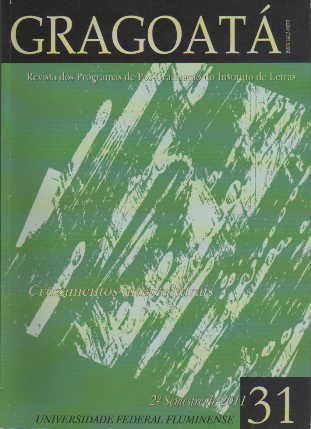Política e produção de subjetividades: música e literatura
DOI:
https://doi.org/10.22409/gragoata.v16i31.33060Palavras-chave:
literatura, música, política, subjetividade, experiência estéticaResumo
O artigo versa sobre as condições contemporâneas da relação entre política e produção de subjetividade na música e na literatura, sob dois ângulos precisos: 1) as diferenças entre os tipos de experiência estética que as duas artes favorecem; 2) a atualização destas experiências nas condições atuais de disseminação social da arte. A partir da contribuição de autores dos Estudos Literários (Zumthor, Iser, Gumbrecht) e da filosofia (Deleuze, Guattari, Lipovetski), entre outros campos, debate-se o contraste entre a sensorialidade da música e o estímulo da literatura à interpretação, depreendendo-se dele 1) as razões das diferenças entre a disseminação social de uma e de outra; 2) as diferenças entre a música e a literatura como instâncias de produção de subjetividade. Neste último item, descreve-se a música como uma força que subjetiva o indivíduo ao “arrastá-lo” (à revelia do seu controle consciente) a uma posição diferenciada, ao passo que a literatura estimula a vivência de realidades alternativas ao cotidiano vivido. Na afirmação da legitimidade destes dois processos de subjetivação, resgata-se a experiência estética sensorial da crítica moral a que ela foi historicamente submetida, ao delimitar-se, para ela assim como para a experiência de cunho interpretativo, lugares politicamente produtivos dentro das condições atuais (democráticas) de circulação de informação. Como objetivo geral, almeja-se, a partir da comparação de cunho tipológico entre as duas artes, o estabelecimento de um referencial analítico descritivo para a observação das suas presenças e posições relativas na sociedade contemporânea.
Downloads
Downloads
Publicado
Edição
Seção
Licença
AUTORIZAÇÃO
Autores que publicam em Gragoatá concordam com os seguintes termos:
Os autores mantêm os direitos e cedem à revista o direito à primeira publicação, simultaneamente submetido a uma licença Creative Commons Atribuição 4.0 Internacional (CC BY 4.0), que permite o compartilhamento por terceiros com a devida menção ao autor e à primeira publicação pela Gragoatá.
Os autores podem entrar em acordos contratuais adicionais e separados para a distribuição não exclusiva da versão publicada da obra (por exemplo, postá-la em um repositório institucional ou publicá-la em um livro), com o reconhecimento de sua publicação inicial na Gragoatá.
A Gragoatá utiliza uma Licença Creative Commons - Atribuição CC BY 4.0 Internacional.











